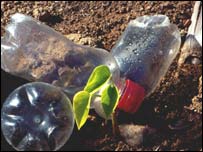British research reveals that although plastic does not decompose, it erodes and spreads on the ocean floor. The plastic is harmful to the digestive systems of the animals, and of the humans who eat them
Yuval Dror, Haaretz, News and Walla!

Once the plastic reaches the sea, it will remain there for hundreds of years
The beaches of the world are getting filled with plastic waste. A group of researchers from the United Kingdom discovered that even the various plastic products, primarily plastic bags and drinking bottles, are made of chemical components that do not break down in nature - they erode slowly, similar to rocks that are eroded by the action of water and wind. As a result, the plastic products turn into microscopic grains, which are scattered at the bottom of the oceans, on the surface of the water and on the beaches. According to the researchers, the plastic granules may have far-reaching consequences for marine ecosystems and the health of animals and humans.
The researchers, from the Universities of Plymouth and Southampton in the UK, collected sand samples and water samples across the UK. The samples - taken from 18 beaches, river estuaries and the ocean floor, at a depth of nine meters - appeared clean to the naked eye. They examined the samples under the eye of the microscope and checked the existence of particles originating from artificial products. The results of the research, which were published in the journal "Science", show considerable pollution originating from plastic, nylon, polyester and acrylic materials.
The researchers claim that it is likely that the microscopic plastic pollution is even greater, since the means at their disposal allowed them to distinguish only particles larger than 20 microns (one micron is one millionth of a meter), and only if they were colored.
Dr. Richard Thompson of Plymouth University, who headed the researchers, told the British "Guardian" that the researchers found microscopic fragments in almost every sample they analyzed. "We have since tested 20 more sites across the UK and found these particles in all areas, regardless of whether they are remote or close to large population centers." According to the researchers, a comparison they made with sediment samples from 40 years ago showed that there has been a significant increase in the scope of microscopic plastic pollution.
The researchers explain that the great danger of this type of contamination lies in the fact that it enters the digestive system of animals living in seawater, which swallow it together with their natural food. Since some of these animals end up on people's plates, it's hard to know what the long-term consequences of the phenomenon might be. Simon Boxel, an oceanographer from the "Center for Ocean Research" in Southampton, told the "Nature" website that from the moment the plastic reaches the sea, it will remain there for hundreds and maybe even thousands of years. "We are stuck with this plastic. It is impossible to filter the oceans from plastic waste. They are too big," he said.
Advertisement Data from the Ministry of Environment in Israel shows that plastic is 14% of the total weight of household waste in Israel and about 35% of its volume. The amount of plastic products consumed in Israel reaches about 450 thousand tons per year, not including packaging that comes with imported products. Although the plastic can be collected and sent for recycling and also used as a raw material in burning and energy production processes, in 2002 less than 7% of all plastic waste in Israel was sent for recycling - only about 30 thousand tons. For comparison, about 30% of the paper waste produced in Israel ends up being recycled and about 57% of the iron-based waste goes through recycling processes.
Dr. Thompson said that the researchers will now focus on the effects of the microscopic pollution of the plastic products on the marine animals and humans. "If you look at the garbage piles on the beaches you will see a lot of items that do not belong there. We must all try to reduce the amount of plastic waste we produce and try to recycle as much of it as possible," he concluded.
For information on the BBC website
https://www.hayadan.org.il/BuildaGate4/general2/data_card.php?Cat=~~~841207696~~~272&SiteName=hayadan
